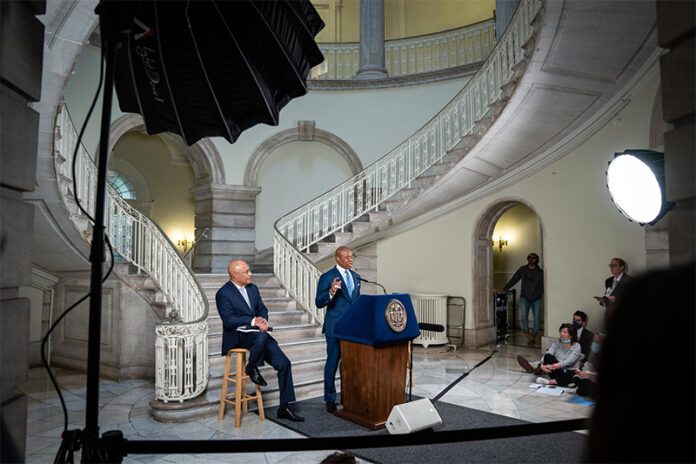Eric Adams recently released his proposed $99.7 billion budget for the upcoming fiscal year. After the budget went public, the mayor spoke with reporters at a press conference, touting the budget as an investment in the city and its residents.
“This is not spending, this is investing,” he claimed. “A safe city is going to be a productive city and that’s what those dollars are going for.”
Fighting crime is arguably the most important priority for Adams, who proposed adding $228 million to the NYPD. While he doesn’t plan to increase the number of uniformed officers, his budget includes funding for police resources, including a new anti-gun unit and more overtime pay. His budget also allocates $55 million for mental health workers who will respond to mental health calls, instead of police officers.
Other funding priorities in the $100 billion proposed operating budget include funding for education, parks, and social programs. The mayor sees the latest budget as a way for the city to bounce back further from a Covid-induced slump.
“After two years of struggle, we are on the brink of a recovery that offers us a once-in-a-generation opportunity to make real change on a grand scale,” said Mayor Adams. “I made a commitment to New Yorkers to spend taxpayer dollars more wisely while making the upstream investments necessary to ensure a robust recovery — and this administration’s first Preliminary Budget achieves exactly that.”
“We are cutting spending, making government run more efficiently, investing in public safety, and providing much-needed help to working families across our city. The steps we are taking together will make New York a safer, more just, and more prosperous city for all.
Adams also proposed an additional $5 billion for affordable housing over the next decade. Under the proposal, the Department of Housing Preservation and Development is slated to get $3.6 billion for housing subsidies. Another $1.2 billion would go to NYCHA for the Permanent Affordability Commitment Together program, while $200 million will go to in-unit repairs in public housing units.
According to Adams, the extra $5 billion over the next decade will “make critical repairs at NYCHA, subsidize those who need help staying in their existing homes, and build more deeply affordable housing for the entire city.”
$5 billion is a substantial investment, but critics argue that it is a mere drop in the bucket, as New York City has one of the most severe affordable housing crises in the country. Last year alone, NYCHA spent $4.1 billion, over 80% of the additional $5 billion Eric Adams pledged to allocate over the next decade.
Housing advocates point out that NYCHA needs roughly $40 billion just to make necessary repairs across its 335 housing developments. Advocacy groups desire $1.5 billion in annual funding, which is three times higher than the amount proposed by Eric Adams.
“Unfortunately, the Adams administration’s modest capital increase for housing merely treads water and will not make a meaningful dent in this emergency,” Rachel Fee, executive director of the New York Housing Conference, told Crain’s.
Mayor Adams fulfilled a campaign promise to reign in spending, as the latest budget proposal is roughly 3% slimmer than former NYC mayor Bill de Blasio’s final spending package of $102.8 billion.
“We are cutting spending, making government run more efficiently, investing in public safety, and providing much-needed help to working families across our city”, Adams said. “The steps we are taking together will make New York a safer, more just, and more prosperous city for all.”
Tyler graduated from Virginia Commonwealth University in 2017 with a Bachelor's degree in Urban and Regional Studies. Currently based in Los Angeles, he works as a freelance content writer and copywriter for companies in real estate, property management, and similar industries. Tyler's main professional passion is writing about critical issues affecting big and small cities alike, including housing affordability, homelessness, inequality, and transportation. When he isn't working, he usually plans his next road trip or explores new neighborhoods and hiking trails.



